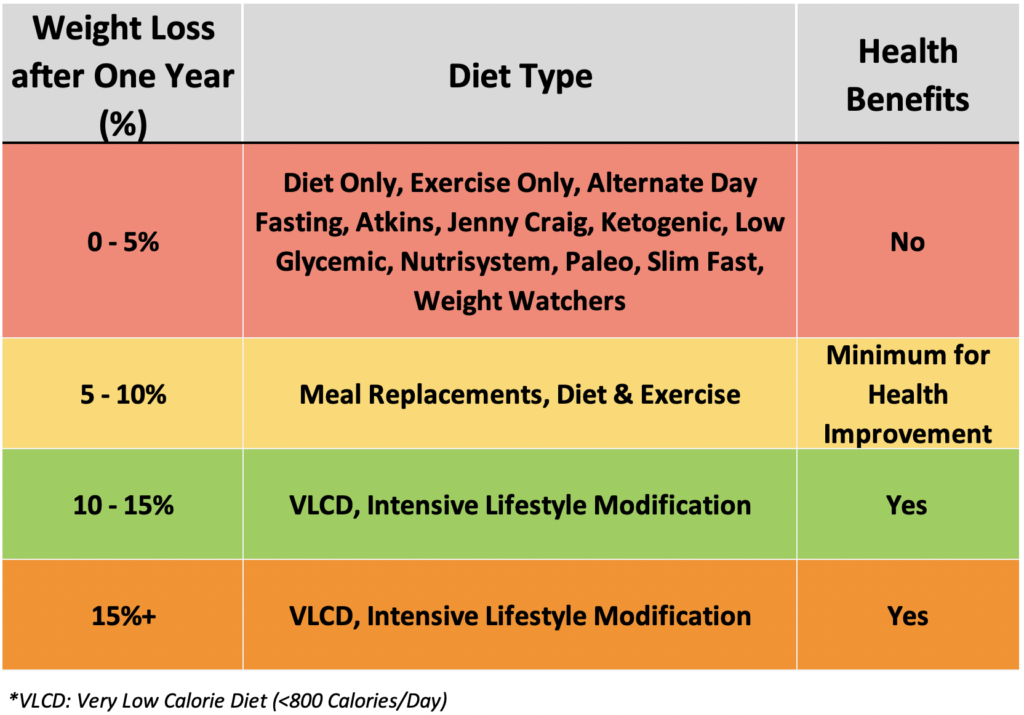Weight loss is not a linear process. I know this is what you’ve been told but it is not true. You’ve been told that if you cut your calories by 500 calories/day for one week that you’ll lose 1 pound per week.
500 Calories/Day x 7 Days = 3500 Calories/Week
3500 Calories = 1 Pound of Body Mass
If you have 50 pounds to lose, then by this math you will lose 50 pounds in 50 weeks. But it doesn’t work this way for a myriad of reasons (please see The Science of Dieting’s weight loss e-book for a detailed explanation) and it will never work this way. The people that are telling you this have a limited knowledge or understanding of energy metabolism.
The truth is that weight loss is curvilinear, not linear and when graphed, looks more like a “U” than a backslash (\) (Figure 10.1.)

On any diet program the vast majority of your weight loss is going to occur in the first two to three months of the diet. This is the first phase of weight loss. In the next three to six months people tend to continue losing weight but not as rapidly. After six months on a weight loss program, people tend to slowly start to regain the weight they have lost. Ideally the rate of weight regain will be slow and eventually they will reach a new set weight.
In our earlier section (02), You Have to Set Realistic Expectations, I outlined how much weight, on average, one can expect to lose on various diets. To help explain figure 10.1 I think it is worth revisiting here (Table 02.1).

It is worth noting that most diets will yield a significant weight loss within the first three to six months; however, weight regain tends to occur in months six through twelve leaving you with less than a five percent overall weight loss after one year of dieting. Yet, many people with obesity want to lose 25 – 35% of their body mass during a one-year program. A more realistic goal would be within the 10 – 20% percent range as this is what research has shown to be attainable.
It must also be pointed out that fad diets (named diets) are not nearly aggressive enough to help you lose the type of weight you’re likely looking for. And by aggressive, I mean that they aren’t restrictive enough. The most successful diets are those that restrict calories below 800 calories/day (very-low calorie diet; VLCD) or between 800 and 1200 calories/day (low-calorie diet; LCD).
The data I presented you in figure 10.1 is based on the scientific literature on weight loss and was constructed for illustrative purposes. However, the data in figure 10.2 was adapted from Unick and colleagues and includes a one year diet phase and an eight year follow up.

Whatever your ultimate weight loss goal might be, you will need to aim lower than that actual goal as you will never finish a diet at your greatest weight loss. There is always going to be some weight regain before reaching your new (temporary) set weight.
It turns out that the old adage of “slow and steady” wins the race in weight loss isn’t typically true. It is better to try to lose as much weight as possible during the early stages of your diet because this time period will control how much you weigh moving forward.
There are a number of reasons why this early weight loss followed by a plateau and weight regain phenomenon occurs, reasons which we are not going to get into right here and now. However, if you trust me that the first two to three months of your diet are SOOOO super important, then you will see why in our next section (11) I recommend that you Eat Nothing But Meal Replacements, Kits or Delivery for the First Eight Weeks of Your Diet.